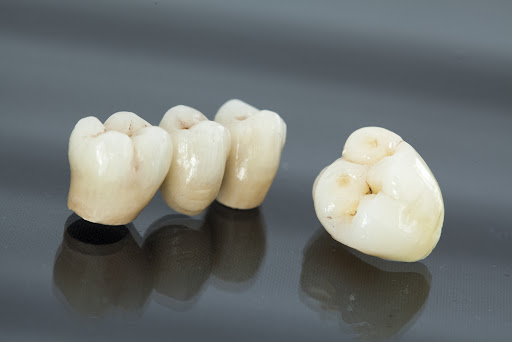
Are you seeking the key to a more confident smile and enhanced oral health? At Whitlow Dental Care, your journey to a brighter, healthier smile begins. Led by the experienced and compassionate Fresno cosmetic dentist, Dr. Kurt Whitlow, we take pride in our commitment to serving the Fresno, CA community.
At our practice, we are skilled in the art and science of dental crowns and bridges, two transformative solutions that can restore the beauty and functionality of your teeth. If you're ready to discover how these dental innovations can rejuvenate your smile, contact us today at (559) 441-7700.
What Are Dental Crowns and Bridges?
Dental crowns, also known as dental caps, are custom-made restorations that cover and encase a damaged, weakened, or aesthetically compromised tooth. They serve a dual purpose of enhancing the tooth's strength and appearance. These tooth-shaped "caps" are meticulously crafted to match the size, shape, and color of your natural teeth, providing a seamless and attractive restoration.
Dental bridges are fixed dental appliances used to replace missing teeth by bridging the gap created by one or more absent teeth. They consist of two main components: dental crowns, placed on the natural teeth on either side of the gap, and one or more artificial teeth, called pontics, which fill the space left by the missing teeth.
Benefits of Dental Crowns and Bridges
- Restoration of Functionality: Dental crowns and bridges restore the ability to chew and speak properly, which can be compromised by damaged or missing teeth.
- Aesthetic Enhancement: Dental crowns and bridges improve the appearance of the smile by concealing imperfections, filling gaps, and replacing missing teeth, enhancing overall facial aesthetics.
- Prevention of Shifting: Dental bridges prevent adjacent natural teeth from shifting into the gap left by missing teeth, preventing misalignment and bite problems.
- Distribution of Bite Force: Crowns and bridges evenly distribute bite forces across the abutment teeth, reducing the strain on individual teeth.
- Protection of Weakened Teeth: Crowns provide protection and strength to weakened or damaged teeth, preventing further decay or fractures.
- Versatility: Crowns and bridges can be used to address a variety of dental issues, including tooth decay, broken dental fillings, cracks, discoloration, and missing teeth.
- Durable and Long-Lasting: When properly cared for, crowns and bridges are durable and can last many years, providing a long-term solution for dental problems.
- Customization: These restorations are customized to match the color, shape, and size of your natural teeth, ensuring a seamless and harmonious appearance.
- Improved Self-Confidence: Aesthetic enhancements and a complete smile can boost self-confidence and overall quality of life.
- Conservative Approach: Crowns and bridges offer a conservative alternative to more extensive dental procedures, preserving natural tooth structure.
Types of Dental Crowns & Bridges
Dental Crowns
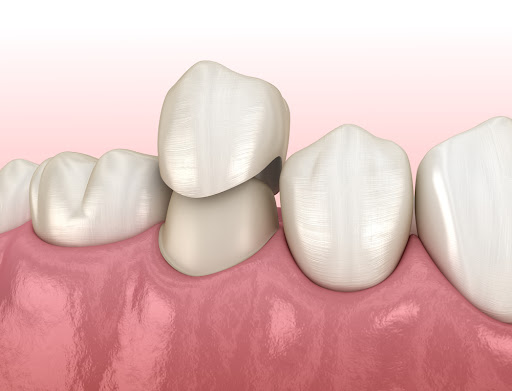
- Porcelain Crowns (All-Ceramic Crowns): These crowns are known for their natural appearance and are often used for front teeth. They can be color-matched to the surrounding teeth, making them virtually indistinguishable from natural teeth.
- Metal Crowns: These crowns are typically made from alloys like gold, palladium, or a combination of metals. They’re known for their durability and are often used for molars in the back of the mouth.
- Porcelain-Fused-to-Metal (PFM) Crowns: PFM crowns combine the strength of metal with the aesthetics of porcelain. They are suitable for both front and back teeth.
- Zirconia Crowns: Zirconia crowns are known for their strength and durability. They are often used for back teeth and are less likely to chip or break compared to porcelain.
- Resin Crowns: These crowns are typically more affordable but are less durable than other types. They are often used as temporary solutions or for primary teeth in children.
- Ceramic Crowns: Ceramic crowns are similar to porcelain crowns but may be more affordable. They provide a natural appearance and are used for front and back teeth.
- Temporary Crowns: These crowns are usually made of acrylic or stainless steel and are used to protect a prepared tooth while a permanent crown is being fabricated.
Dental Bridges
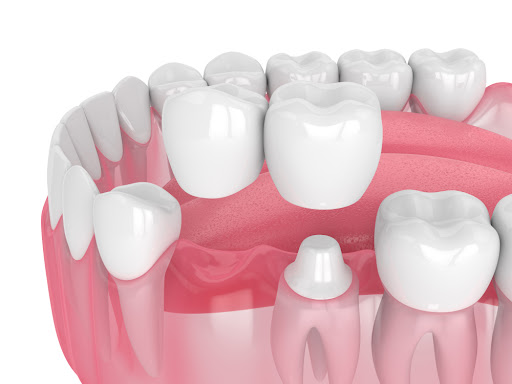
- Traditional Fixed Bridge: A common dental bridge type, it uses crowns on adjacent teeth to support one or more artificial teeth, known as pontics.
- Cantilever Bridge: In cases where only one adjacent tooth is available for support, a cantilever bridge is used, anchoring the pontic on that single tooth.
- Maryland Bridge (Resin-Bonded Bridge): A conservative option for replacing front teeth, the Maryland bridge utilizes a metal or porcelain framework bonded to adjacent teeth for support, without the need for extensive enamel reduction.
Candidacy for Dental Crowns and Bridges
Qualification for dental crowns and bridges depends on the specific dental needs and oral health of an individual. Here are some common factors that determine whether someone is a candidate for these restorations:
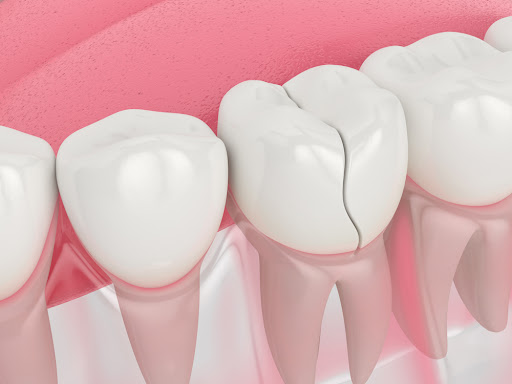
- Damaged or Weakened Teeth: Individuals with teeth that are significantly damaged, weakened, or compromised due to factors such as decay, fractures, or extensive fillings may be candidates for dental crowns. Crowns can provide protection and strength to these teeth.
- Missing Teeth: Dental bridges are typically recommended for individuals with one or more missing teeth, provided they have suitable adjacent teeth to support the bridge.
- Good Oral Health: Candidates for crowns and bridges should have a generally healthy oral cavity, including healthy gums and the absence of active gum disease. Any underlying dental issues should be addressed before receiving these restorations.
- Sufficient Tooth Structure: To support dental crowns, there should be enough healthy tooth structure remaining after any necessary preparations. If tooth structure is insufficient, alternative treatments like dental implants may be considered.
- Desire for Aesthetic Improvement: Individuals seeking to enhance the appearance of their smile, whether to conceal imperfections, fill gaps, or replace missing teeth, can be candidates for crowns and bridges.
- Commitment to Oral Hygiene: Proper oral hygiene practices, including regular brushing, flossing, and dental check-ups, are essential for the success and longevity of crowns and bridges.
The Dental Crown Process at Whitlow Dental Care
Consultation
Your journey begins with a consultation at Whitlow Dental Care. Your Fresno dentist will examine your tooth to determine if a dental crown is necessary. If a dental crown is recommended, a treatment plan will be discussed. You'll have the opportunity to ask questions and address concerns.
Design
Your Fresno dentist will take impressions of your tooth to create a customized crown. You'll discuss the shade and material of the crown with them to ensure it matches your natural teeth.
Preparation
In a subsequent appointment, the tooth receiving the crown will be reshaped to accommodate the crown. A local anesthetic is used to numb the area beforehand, and sedation dentistry options are also available if you’re feeling nervous or in for a long procedure. A temporary crown is placed to protect the prepared tooth while the permanent crown is being fabricated.
Placement
Once the permanent crown is ready, it will be cemented onto the prepared tooth. Your dentist will make any necessary adjustments to ensure a proper fit and the crown will be polished for a natural look and feel.
Dental Bridge Process
Consultation
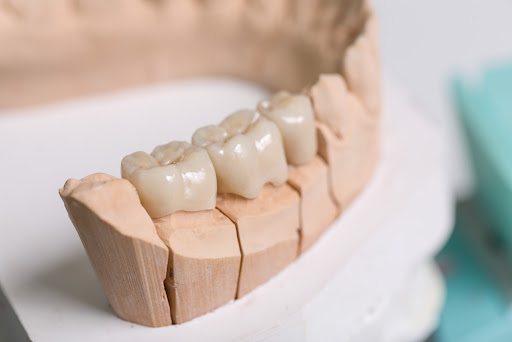
Your consultation will involve an examination to determine the need for a dental bridge. If a dental bridge is recommended, a treatment plan will be created, including the choice of bridge type.
Design
Your Fresno dentist will take impressions of your teeth to create a customized bridge. You'll discuss the choice of a traditional fixed bridge, a cantilever bridge, or a Maryland bridge with them, depending on your needs.
Preparation
If a traditional fixed bridge is chosen, the teeth adjacent to the gap will be reshaped to accommodate the bridge. A local anesthetic is used to numb the area beforehand, and sedation dentistry options are also available if you’re feeling nervous or in for a long procedure. In addition, a temporary bridge may be placed to protect your prepared teeth while the permanent bridge is being fabricated.
Placement
Once the permanent bridge is ready, it will be fitted and cemented onto the prepared teeth. Your Fresno cosmetic dentist will make any necessary adjustments to ensure a proper fit and bite. Finally, the bridge will be polished for a natural look and feel.
Aftercare for Dental Crowns and Bridges
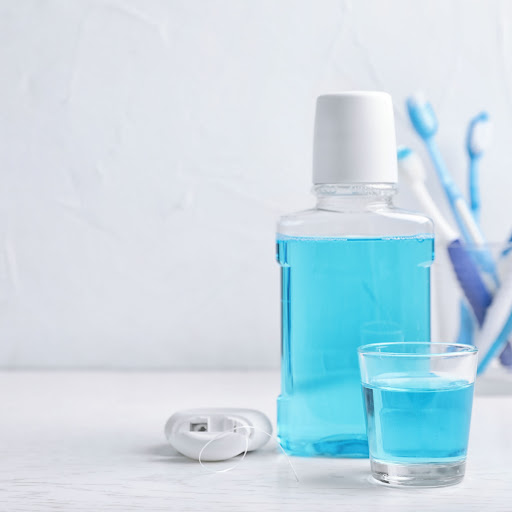
- Regular Brushing: Maintain good oral hygiene by brushing your teeth at least twice a day with a soft-bristle toothbrush. Pay extra attention to the gumline, ensuring thorough cleaning around the crown or bridge.
- Flossing: Daily flossing is crucial to remove food particles and plaque buildup around your crown or bridge, protecting against gum issues and decay.
- Antimicrobial Rinse: Incorporate an antimicrobial mouthwash as recommended by your dentist to control bacteria and enhance oral hygiene.
- Avoid Hard Foods: Refrain from biting on hard objects or foods such as ice, nuts, or hard candies that could potentially damage your crown or bridge.
- Limit Sugary Foods: Reducing your consumption of sugary foods and beverages can help prevent tooth decay around the restoration.
- Regular Dental Visits: Schedule routine dental check-ups and cleanings to monitor the condition of your crown or bridge and maintain overall oral health.
- X-Rays: Periodic X-rays may be recommended by your Fresno dentist to ensure there are no underlying issues beneath the crown or bridge.
- Sensitivity: It's normal to experience some sensitivity after the procedure. However, if it persists or worsens, contact your Fresno dentist for evaluation and guidance.
- Discomfort: Minor discomfort is common, but if you experience severe pain or swelling, contact your dentist promptly, as it may indicate an issue that requires attention.
- Nightguards: If you tend to grind or clench your teeth, your dentist may recommend a nightguard to protect your crown or bridge from excessive forces.
- Immediate Attention: If your crown or bridge becomes loose, dislodged, or damaged, contact your Fresno dentist for an emergency visit immediately. They’ll assess the situation and provide necessary repairs or replacements.
Frequently Asked Questions
▼Are dental crowns and bridges covered by insurance?
Coverage for dental crowns and bridges varies by dental insurance plan. Generally, whether they are covered depends on the type of plan you have, the reason for the procedure, and the specific terms of your insurance.
Dental insurance often categorizes these procedures as major and may cover them at a percentage lower than preventive or basic services. It's crucial to review your policy, check for waiting periods, and understand annual maximums to determine your coverage. Your dentist can help you navigate the insurance process and assess your specific coverage for crowns and bridges.
▼Are dental crowns and bridges painful?
The placement of dental crowns and bridges is typically not painful during the procedure. Dentists typically use local anesthesia to numb the area, ensuring you don't feel pain. However, you may experience some mild discomfort or sensitivity after the procedure, which is generally manageable with over-the-counter pain relievers. Any severe pain or persistent discomfort should be discussed with your dentist, as it may indicate an issue that needs attention.
▼Can dental crowns and bridges be removed and recemented?
Yes, dental crowns and bridges can be removed and recemented by a dentist if necessary. There are various reasons for doing so, such as repairing or replacing a damaged crown or bridge, addressing issues with fit or alignment, or performing maintenance on the supporting teeth. Your dentist can evaluate whether recementing is a suitable option for your specific case and provide the necessary care.
▼How long do dental crowns and bridges last?
The longevity of dental crowns and bridges can vary depending on several factors, including the type of material used, oral hygiene, and daily wear and tear. On average, dental crowns and bridges can last anywhere from five to 15 years or more.
It's important to maintain good oral hygiene, avoid habits like teeth grinding, and follow your dentist's aftercare recommendations to maximize the lifespan of your crowns and bridges.
Learn More About Crowns and Bridges, Call Whitlow Dental Care Today!
Unveil your best smile with dental crowns and bridges at Whitlow Dental Care. Contact our Fresno, CA office today at (559) 441-7700 to explore your path to dental excellence. Whitlow Dental Care proudly serves Fresno and the surrounding areas such as Kingsburg, Madera, and Muscatel. Your confidence and radiant smile await.





